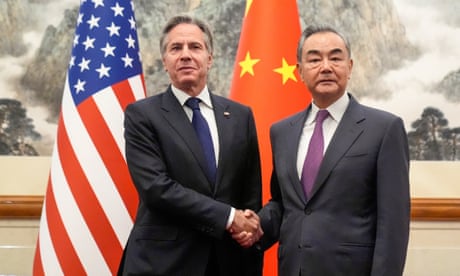
China’s foreign minister, Wang Yi, has warned the US that the recent improvements in the two countries’ relations were being jeopardised by “disruptions” that could take them back to a “downward spiral” leading to rivalry, confrontation and even conflict.
Wang was speaking at the start of a meeting in Beijing with the US secretary of state, Antony Blinken, at a time of renewed tension in the relations between the superpowers. The US, he said, should not step on China’s “red lines”.
Blinken stressed the duty of both nations to manage responsibly what he called their “most consequential relationship”. His three-day visit to China comes five months after a largely successful summit between Joe Biden and Xi Jinping, which was followed by a decrease in tensions over Taiwan, the re-establishment of contacts between the two countries’ militaries, and bilateral cooperation on counter-narcotics efforts.
The US is threatening sanctions against Chinese companies for supplying the Russian defence industry, and is considering tariffs in the face of what Washington says is the over-capacity of Chinese manufacturing. The Biden administration has also tightened export controls on advanced computer chips.
While Blinken was on his way to China, Congress passed legislation that would ban the social media platform TikTok in the US within a year – if its Chinese parent company, ByteDance, does not sell its stake – as well as provide billions of dollars in aid for the Indo-Pacific that would largely benefit Taiwan.
Blinken and his team met President Xi later on Friday, after more than five hours of meetings with Wang at the Diaoyutai state guesthouse in Beijing.
Wang, setting a stern tone at the beginning of those meetings, suggested the bilateral relationship was at a turning point. Since the Biden-Xi summit in San Francisco in November, he said it was “beginning to stabilise” with increased dialogue and cooperation.
Through an official interpreter, Wang said: “This is welcomed by our two peoples and the international community. But at the same time, the negative factors in the relationship are still increasing and building and the relationship is facing all kinds of disruptions.
“China’s legitimate development rights have been unreasonably suppressed and our core interests are facing challenges,” he said. “Should China and the United States keep to the right direction of moving forward with stability or return to a downward spiral?
“This is a major question before our two countries, which tests our sincerity and ability,” Wang added, warning the US “not to step on China’s red lines on China’s sovereignty, security and development interests”.
“Should our two sides lead international cooperation on global issues and achieve win-win for all, or engage in rivalry and confrontation or even slide into conflict, which would be a lose-lose for all?” Wang asked. “The international community is waiting for our answer.”
In response, Blinken, said he welcomed the opportunity to have face-to-face talks “to avoid misunderstandings, to avoid miscalculations”.
“That it really is a shared responsibility that we have, not only for our own people, but for people around the world, given the impact that the relationship between our countries has around the world,” Blinken said.
“It’s important to demonstrate that we’re managing responsibly the most consequential relationship for both of us in the world.”
US officials say there has been relative calm in the Taiwan Strait since the Biden-Xi summit, after a period of high tension in which Chinese warships and planes would regularly approach Taiwan. At the same time, however, there has been increasing friction in the South China Sea between China – which claims sovereignty over most of the sea – and neighbouring countries, particularly the Philippines, a US ally.
One of the key topics in the Beijing talks will be counter-narcotics cooperation. At November’s summit, China took some steps to curb the supply of chemical precursors and equipment used by traffickers to make the synthetic opioid fentanyl, the leading cause of death for Americans, aged 18 to 49. However, there is concern in Washington that the steps taken by Beijing have been token, and have yet to have much effect.
Blinken, who is accompanied in Beijing by Todd Robinson, assistant secretary of state for international narcotics and law enforcement affairs, held a brief meeting with China’s public security minister, Wang Xiaohong, focused on counter-narcotics.
Blinken told the minister: “Our ability to cooperate in this area, to show results, will have a very positive impact on relations between our two countries.”
The secretary of state has also come to deliver a message that Chinese companies could soon face sanctions from the US and its European allies for selling weapons components and dual-use equipment to Russia’s arms industry, which is rebuilding and modernising to feed Vladimir Putin’s effort to conquer Ukraine.
China has shrugged off appeals to curb those exports, describing them as foreign interference in the trade relations between China and a close strategic partner.